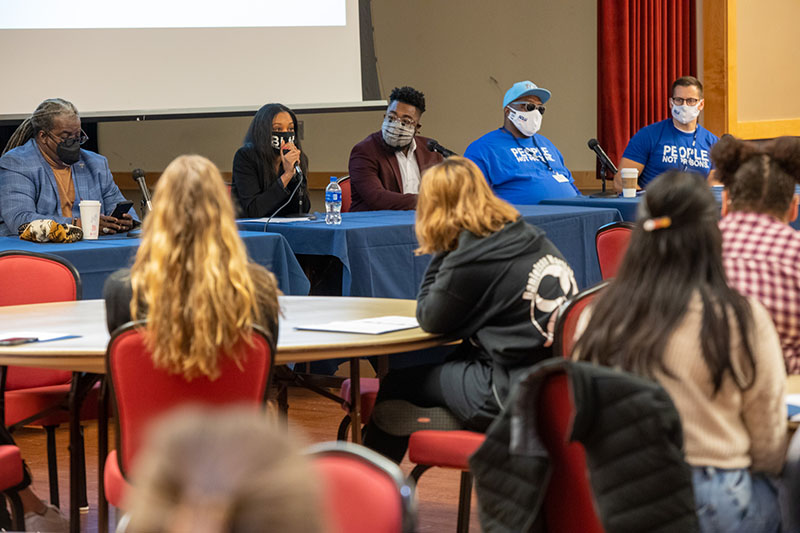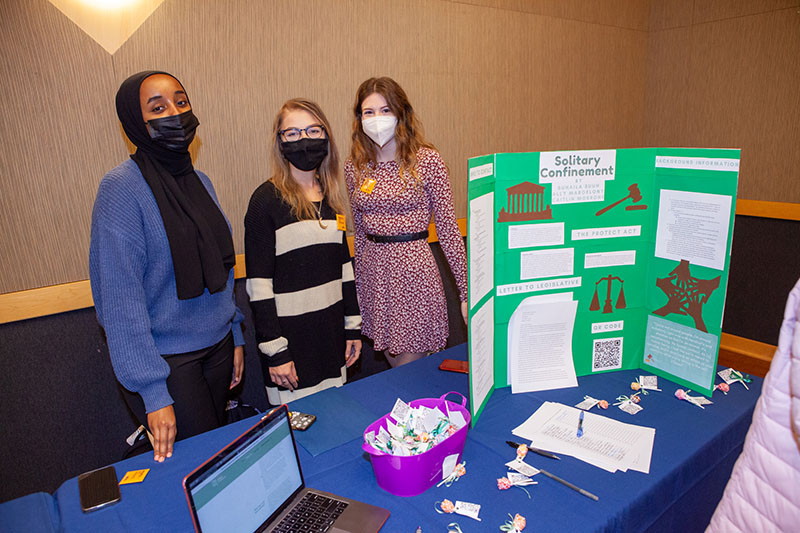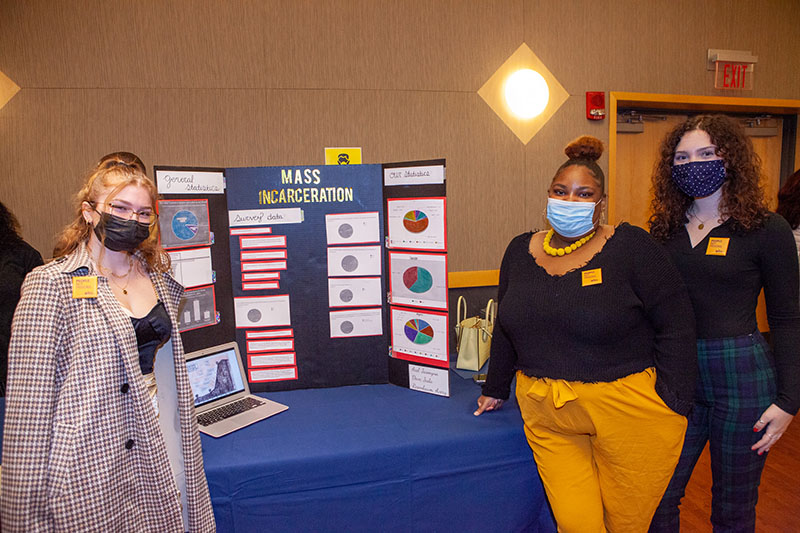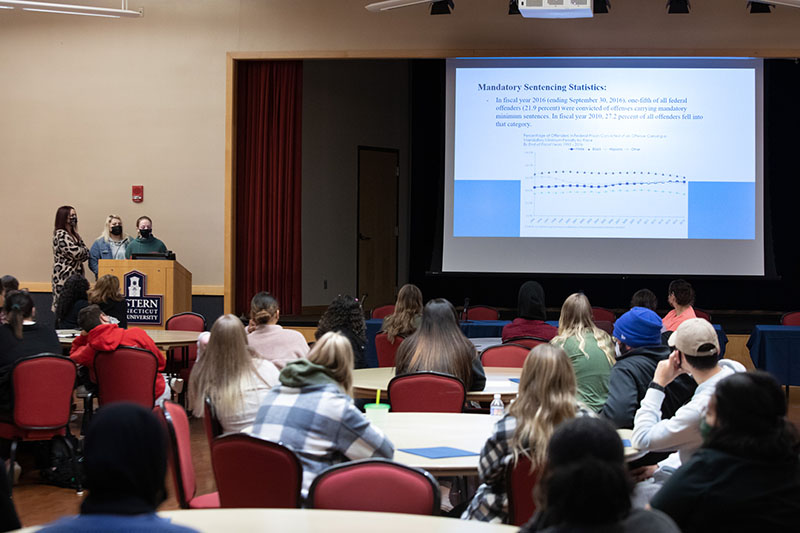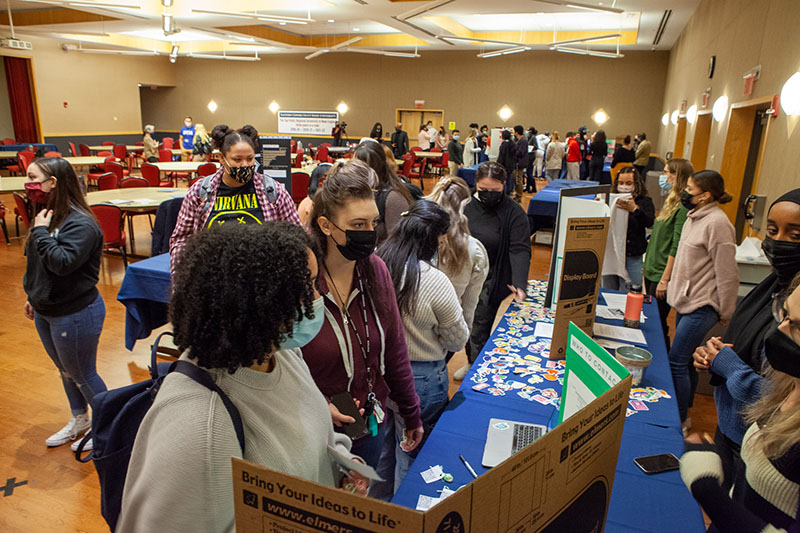- Apply
- Visit
- Request Info
- Give
Social Action Day focuses on mass incarceration
Annual event is led by junior social work students
Written by Bobbi Brown and Molly Boucher
Published on November 11, 2021
Students from Eastern Connecticut State University’s Social Work Program held the seventh annual Social Action Day on Nov. 9 to bring awareness to the policies related to mass incarceration. Led by juniors in the social work program, the day also brought awareness to systemic racism, advocacy work being done in the state, and experiences of those personally impacted by the prison system.
Overseen by Social Work professors Sarah Nightingale, Megan Stanton and Isabel Logan, this year’s topic of mass incarceration was chosen by the previous year’s students, who are now seniors in the program. “It was clear during the brainstorming that there was a lot of passion and energy from social work students around policies related to mass incarceration,” said the faculty supervisors.
How the students chose to advocate for the topic was up to them. The current juniors decided to include a variety of presentations, including a panel moderated by junior Alyssa Garcia, a short documentary and posterboard presentations.
After the opening remarks and overview from junior social work students Molly Boucher and Quinton Sneed-Lott, the day continued with students presenting their research on issues surrounding mass incarceration. Students also displayed their findings by crafting posterboards for attendees to visit.
For the panelists, students chose individuals within the state who have addressed mass incarceration. The panel had five members: Dean Selders from Moral Mondays Hartford, Gus Marks-Hamilton and Anderson Curtis from the ACLU of Connecticut, Rahisha Bivens from Stop Solitary Connecticut and State Rep. Brandon McGee from Connecticut’s Fifth District.
Panelists shared the background of their work in tackling mass incarceration. “We are at war on ending solitary confinement in Connecticut,” said Bivens, “organizing to make sure that the power of the people is greater than the people in power.”
Bivens said that those in the prison system are forced to face trauma that is brought on from being incarcerated. “Our tax dollars should not perpetuate a system that harms people,” she said.
Curtis and Selders informed attendees that it is only through continuous advocacy and self-reflection that change can happen. “We have to be comfortable with being uncomfortable,” said Curtis. Bishop Selders encouraged students to bring the conversations taking place outside of Social Action Day. “You can change things if you get passionate and show up.”
Marks-Hamilton and Rep. McGee shared wisdom with the students, giving them advice on how to continue with advocacy while also practicing self-care. McGee emphasized the importance of social media when trying to contact government officials. “Be laser focused on one topic, and hit us with every form of contact,” he advised. “If you really want to get someone’s attention, start the conversation on social media.”
Marks-Hamilton emphasized the importance of enjoying the work you’re doing, and how to avoid burnout, a frequent problem in the social work field. “When you have the opportunity to celebrate wins, take them.”
“It was really amazing to see current social workers and advocates doing the work. It showed us [the junior class] that we can really make a difference,” said Boucher, a current junior in the program. “The system isn’t broken; it was built to oppress communities of color. Watching people in Connecticut working to dismantle and rebuild the prison system was inspiring. It’s work I hope to do one day.”
Students also provided resources on how to get involved in the fight against mass incarceration. Through a variety of case studies, informational games, QR codes to learn more about current policies and bills, ways to contact legislators and petitions, students created interactive ways for attendees to learn more about the subject.
“Social Action Day shined a light on policies related to mass incarceration in Connecticut,” said Logan, Stanton and Nightingale in a written statement. “The program informed participants on these policies, centered around the voice of individuals who have been most directly affected by mass incarceration in our state, and provided actionable steps that individuals can take to support change.”



